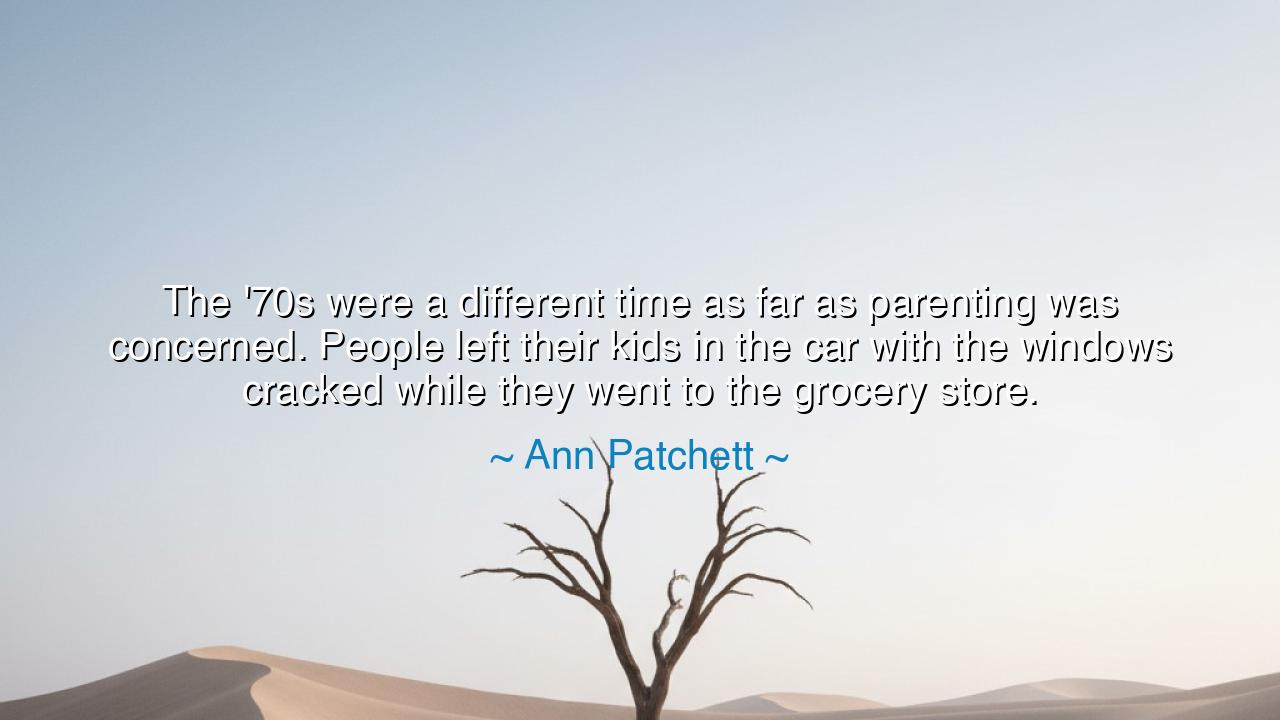
The '70s were a different time as far as parenting was
The '70s were a different time as far as parenting was concerned. People left their kids in the car with the windows cracked while they went to the grocery store.






Hearken, O children of generations yet to be, and attend to the words of Ann Patchett, who reflects with both clarity and a measure of astonishment upon the practices of past eras: “The '70s were a different time as far as parenting was concerned. People left their kids in the car with the windows cracked while they went to the grocery store.” In these words lies a recognition of the shifting tides of human understanding and care: what was once considered acceptable now stands as a lesson in vigilance, prudence, and the evolving responsibilities of those who nurture the young.
The origin of this reflection rests in Patchett’s observation of her own upbringing and the culture of parenting during the 1970s, a time when societal norms permitted liberties that modern sensibilities deem perilous. The act of leaving children unattended, even briefly, reflects both the trust and the naivety of an age, a period before awareness of dangers was widespread or codified. Patchett’s words carry the weight of historical perspective, revealing how the responsibilities of parenting are shaped as much by circumstance and culture as by intention.
The meaning of her words is both cautionary and instructive. Parenting is not merely a function of care, but a dynamic practice shaped by knowledge, awareness, and the evolving understanding of risk. To leave children unattended, even briefly, was once normalized, yet it teaches the enduring lesson that vigilance is a cornerstone of nurture. Patchett reminds us that parenting demands constant presence, attentiveness, and a readiness to adapt to the knowledge and dangers of one’s time.
Consider the historical example of Benjamin Spock, whose 1940s and 1950s parenting guides shaped generations of Americans. While revolutionary in emphasizing warmth and emotional intelligence, even his guidance reflected the limits of contemporary understanding. Parents once trusted in routines and societal norms that today would be questioned. Like Patchett observes, the context of parenting is mutable, and the act of safeguarding children evolves with knowledge, culture, and moral perception.
Yet Patchett’s reflection also carries a subtle admonition: the liberties of past eras, once considered benign, may now appear reckless. Awareness of hazards—environmental, social, or emotional—is integral to the exercise of parental duty. The act of nurture is inseparable from foresight, vigilance, and discernment, teaching that the landscape of responsibility is both temporal and ethical, and that understanding and adaptation are the measures of wisdom.
The lesson for future generations is luminous: do not presume that practices of past ages suffice for the present. Parenting requires constant reflection, learning, and adjustment, guided by knowledge, observation, and ethical responsibility. What may appear acceptable or convenient can endanger the young, and vigilance, foresight, and preparation are essential virtues in the sacred labor of raising children.
In practical life, one may follow Patchett’s counsel by cultivating awareness, caution, and active engagement. Monitor environments, anticipate risks, and teach children safety while remaining ever vigilant. Understand the evolving nature of hazards, and act not solely according to tradition or convenience, but according to careful observation and responsible judgment. By doing so, one safeguards the physical, emotional, and moral well-being of the young.
Thus, O children of future ages, carry this teaching as both lantern and shield: parenting is ever bound to the context of knowledge and vigilance. Honor the lessons of past eras, yet embrace discernment, foresight, and presence. In this balance lies the enduring task of nurturing life safely and wisely, shaping generations with care, prudence, and unwavering attention to the sanctity of youth.






AAdministratorAdministrator
Welcome, honored guests. Please leave a comment, we will respond soon